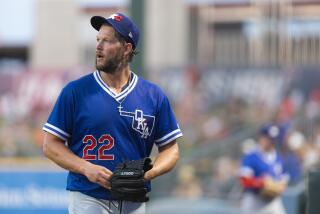Deadline or bust for draft picks
- Share via
When the Minnesota Twins selected left-hander Eddie Bane with the 11th pick in the 1973 draft, the contract negotiations lasted only slightly longer than it took Bane to say “yes.”
And three weeks after his last college game he was living his dream, pitching in the major leagues in front of a sellout crowd of nearly 46,000 at Metropolitan Stadium.
It’s been nearly three months since Stephen Strasburg, the top pick in the June draft, pitched his last game for San Diego State. Yet it’s anyone’s guess when he’ll make his big league debut. Just as it’s anyone’s guess who he’ll be pitching for when -- or even if -- that happens.
And he’s not alone. Teams have until 9 p.m. Monday to reach terms with their June draft picks, yet as of late Saturday 14 of the 32 first-round picks and nearly five dozen players selected in the first 10 rounds were unsigned.
At issue, not surprisingly, is money. Bane, now director of scouting for the Angels, is old-school enough to remember when kids said they’d play for free for a shot at the majors. And they meant it.
But those days have gone the way of high stirrups, Sunday doubleheaders and day games during the World Series.
“The day you draft them, they’re the most excited kid in the world,” says Bane, the man responsible for signing his team’s draft picks. “To me, the agents put a stop sign on it. They take some of the fun out of it.
“But you know why the kids have them and you deal with it.”
No one expects the old days to return. And with good reason -- just look at what it cost Bane. In three years at Arizona State, he was 40-4 with a 1.64 earned-run average, a school-record 505 strikeouts and the only perfect game in school history.
Those numbers are superior to those of Strasburg, who was 22-7 with a 1.59 ERA and 375 strikeouts in three years at San Diego State.
The Twins offered Bane $65,000 and he said yes.
The Washington Nationals’ offer to Strasburg, according to team President Stan Kasten, exceeds $10.5 million. Strasburg said he’ll get back to them.
Bane, however, went straight to the majors. And though he made only 25 big league starts, he says it’s hard to put a price on the experience. Today’s players are little different, he suspects, until their agents get involved and the conversation stops being about dreams and starts being about dollars.
“You see the excitement in their faces when you talk to them,” says Bane, whose brother negotiated his first contract. “You don’t want to see them lose the dream of getting to the big leagues. You tell them how great it is. And they nod their head and say yes.
“And then their agent says ‘hold on, I’m going to get you some more.’ You can’t do anything about it.”
Bane recalls, with pain, the protracted negotiations the Angels had with Jered Weaver and his agent Scott Boras, who is also representing Strasburg.
“Jered said he jumped through the roof when he found out the Angels drafted him,” Bane says. “And then the negotiations took a year.”
That’s a strategy Boras has used before. When the Philadelphia Phillies offered $3 million to Florida State outfielder J.D. Drew, the No. 2 pick in the 1997 draft, Boras turned them down. Drew played in the independent Northern League that summer then reentered the draft a year later, eventually signing with the Cardinals for $8 million.
Weaver and Drew’s younger brother Stephen, who was selected by Arizona, held out almost as long in 2004 before signing $4-million deals just days before the start of the 2005 draft, when the drafting teams would have lost their rights to the players.
Partly in response to Boras’ tactics, baseball modified its draft rules three years ago. Now teams and the players they select face a mid-August signing deadline. If they can’t reach agreement by then, the club loses its rights to the player, who must wait 10 months to go back into the draft.
Although that change hasn’t brought down bonuses -- six clubs paid record bonuses to their top draft picks since the new rule went into effect and 18 of the 30 clubs have seen the amount it’s taken to sign all their draft picks rise -- it has increased the drama as the deadline nears.
The Cincinnati Reds, Seattle Mariners and Florida Marlins each reached agreements with their first-round picks Saturday afternoon, for example, and the pace of signings is expected to increase as the deadline draws closer.
As for Strasburg, those talks will probably drag on to the bitter end before Boras and his client finally settle -- probably for something in the neighborhood of $12 million to $15 million, a record but far less than the $50-million multiyear package Boras once talked of.
That, of course, will set the target for next year’s No. 1 pick, continuing the escalation of draft bonuses. By 2011 and the next round of collective bargaining between baseball and the players’ union, expect to hear clubs demand a slotting system, in which bonuses are predetermined by where a draft pick is selected.
Expect to hear agents and players resist.
What won’t change, though, is the dream. And Bane says even the best-paid players eventually come to see that the dream is priceless.
“It’s a glamorous life,” he says. “And we’re giving them an opportunity to claim that. You’d think that’s a pretty big deal.”
--
More to Read
Go beyond the scoreboard
Get the latest on L.A.'s teams in the daily Sports Report newsletter.
You may occasionally receive promotional content from the Los Angeles Times.








